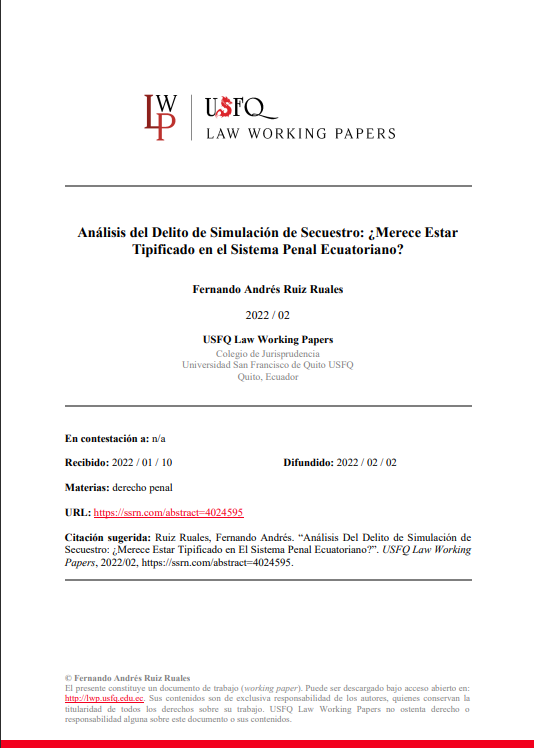Kidnapping Simulation Crime Analysis
Does It Deserve to Be Typified in the Ecuadorian Criminal System?
DOI:
https://doi.org/10.18272/usfqlwp.72Keywords:
Kidnapping, simulation, legal good, personal freedom, Ecuadorian Criminal CodeAbstract
In the Ecuadorian Criminal Code, the simulation of kidnapping is typified and establishes a
penalty of imprisonment from six months to two years for the person who pretends to be
kidnapped. From the analysis of this article, it can be deduced that in this type of criminal
offense, the active subject and the passive subject converge in the same person. In addition, as
a consequence of the commission of this criminal type, it is evident that does not harm any
protected legal good, that is, the material unlawfulness is not fulfilled, an indispensable
element of any criminal offense. Therefore, through the dogmatic analysis of the general theory
of crime, as well as the comparative analysis of different legal systems, it has been possible to demonstrate that by classifying this conduct we are facing an unnecessary criminal
intervention that is exceeding and abusing its power to impose sanctions.
References
Anselm, Paul Johann. Tratado de derecho penal común vigente en Alemania. Buenos Aires:
Hammurabi, 1989.
Ávila, Ramiro. Código Orgánico Integral Penal. Hacia su mejor comprensión y aplicación.
Quito: Corporación Editora Nacional, 2015.
Clutterbuck, Richard. Secuestro & Rescate. México: Fondo de cultura económica, 1979.
Código Orgánico Integral Penal [COIP]. Registro Oficial Suplemento 180, 10 de febrero de
Constitución de la Republica del Ecuador. Registro Oficial 449, 20 de octubre de 2008.
Del Rosal Blasco, Bernardo. “Detención ilegal y secuestro” en Derecho penal español. Madrid:
Dykinson, 2005.
Ferrajoli, Luigi. Derecho y razón: Teoría del garantismo penal. Madrid: Editorial Trotta, 2011.
González-Monguí, Pablo. “La simulación del secuestro o autosecuestro” en Delitos contra la
libertad individual y otras garantías. Bogotá: Universidad Católica de Colombia, 2017.
Jescheck, Hans-Heinrich. Tratado de derecho penal parte general. Barcelona: Editorial Bosch,
Jiménez, René. El secuestro. Problemas Sociales y Jurídicos. México: Universidad Nacional
Autónoma de México, 2002.
Kaufman, Armin. Teoría de las Normas. Buenos Aires: Editorial Depalma, 1977.
Ley Contra el Secuestro y la Extorsión. G.O. 39194, 5 de junio de 2009.
Ley Especial Antisecuestro. Ley número 2.849, 26 de diciembre de 2005.
Ley General para Prevenir y Sancionar los Delitos en Materia de Secuestro. Diario Oficial de
la Federación, 30 de noviembre de 2010.
Ley Orgánica de Garantías Jurisdiccionales y Control Constitucional [LOGJCC]. Registro
Oficial Suplemento 52, 22 de octubre de 2009.
Martiñón, Gilberto.“ El bien jurídico protegido en el delito de secuestro”, en el delito de
secuestro. México: Tirant Lo Blanch, 2012.
Maurach, Reihart. “Derecho Penal. Parte General 1”, en Teoría General del Derecho Penal y
estructura del hecho punible. Buenos Aires: Editorial Astrea, 1994.
Muñoz, Francisco. Derecho Penal: Parte General. España: Tirant lo Blanch, 2004.
Plascencia, Raúl. Teoría del delito. México: UNAM, Instituto de Investigaciones Jurídicas,
Policía Nacional del Ecuador, “Unidad de Antisecuestros y Extorsión” [UNASE]. (25 de
septiembre de 2020). https://www.policia.gob.ec/biblioteca/.
Roxin, Claus. Derecho Penal: Parte general. Navarra: S.L. CIVITAS EDICIONES, 2016.
Serie C No. 144. Corte IDH. Caso Acevedo Jaramillo y otros Vs. Perú. Excepciones
Preliminares, Fondo, Reparaciones y Costas. Sentencia de 7 de febrero de 2006. Párr. 175.
Torres, Villavicencio. Derecho Penal: Parte General. Lima: Editora jurídica Grijley, 2016.
Vega, Harold. “El análisis gramatical del tipo penal”. En Justicia 29. (2016):
http://dx.doi.org/10.17081/just.21.29.1233.
Velásquez, Fernando. Fundamentos de Derecho Penal: Parte General. Bogotá: Tirant lo
Blanch, 2020.
Von Liszt, Franz. Traité de droit pénal allemand. Paris: Editorial Guard, 1911.
Welzel, Hans. Derecho Penal Alemán. Parte General. Chile: Editorial Jurídica de Chile, 1976.

Posted
License
Copyright (c) 2022 Fernando Andrés Ruiz Ruales

This work is licensed under a Creative Commons Attribution-NonCommercial 4.0 International License.
